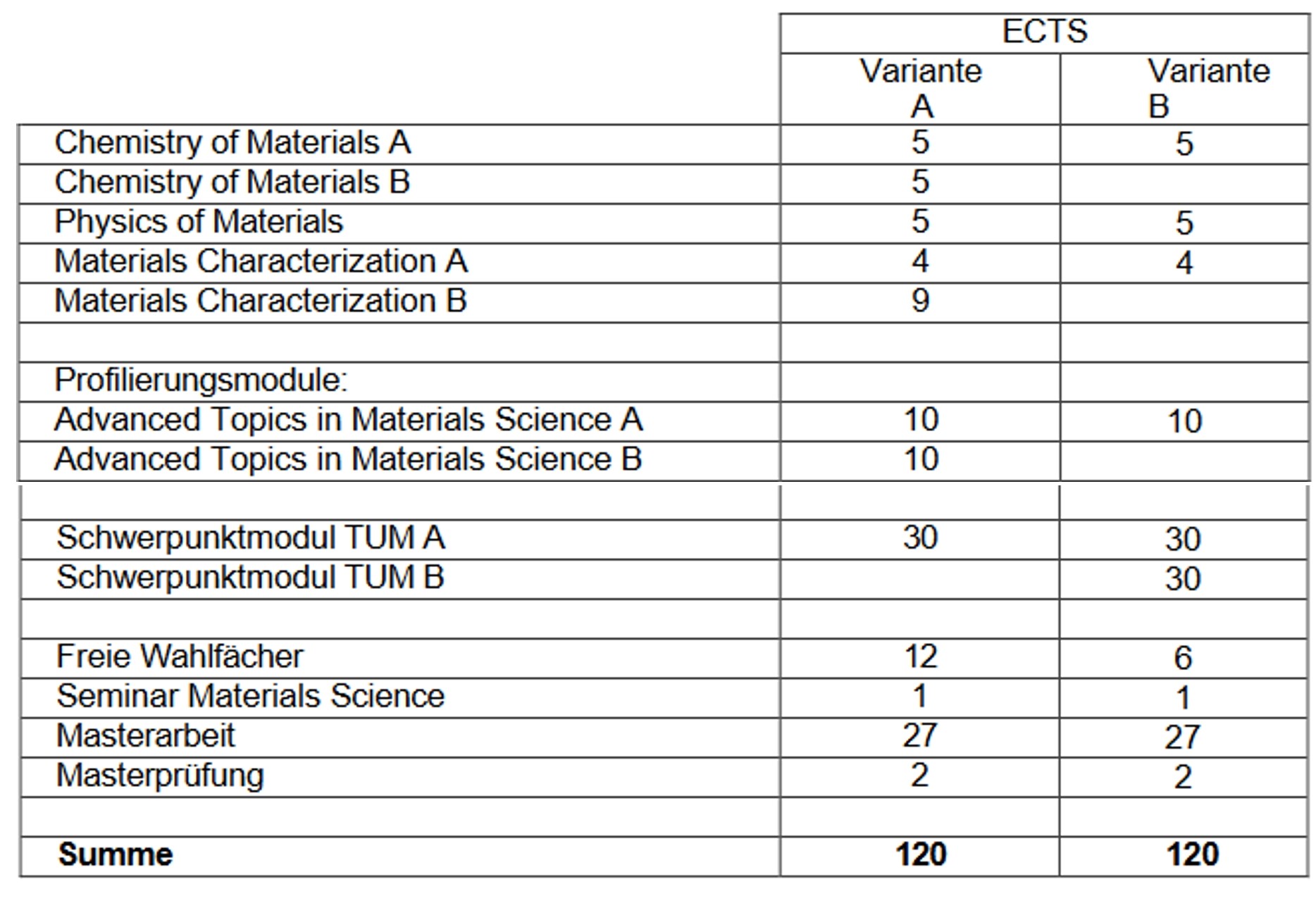Master Science and Technology of Materials
The program provides insight into current methods of material production and characterization, introducing a broad spectrum of technical applications. At TUM, there is a further focus on the treatment of materials regarding their use in technical applications. In particular, materials are analyzed concerning their stability under operating conditions as a function of various operating modes (e.g., pressure, temperature, fields, humidity). This is complemented by the life cycle analysis of the material under different usage conditions. Students also expand their knowledge of the application fields and associated trends of various materials.
From a technical perspective, knowledge is first expanded within the disciplines of chemistry, physics, and materials science at the master’s level. Furthermore, knowledge in materials engineering and mineral or biogenic materials is expanded. Building on this, the Faculty of Mechanical Engineering offers a range of fundamental (e.g., process engineering/thermodynamics) and/or manufacturing-oriented (e.g., manufacturing technologies) modules as the technical, application-oriented engineering component of the program.
Under these aspects, graduates of the program possess the following professional competencies: They are capable of producing a desired material (or product) with defined properties. They apply the latest analytical methods, enabling them to understand and optimize the structure-property relationships of materials concerning the process parameters during production. This allows them to assess and evaluate a material’s performance concerning its application profile, enabling them to use it appropriately, economically, and sustainably. Furthermore, students are equipped to develop novel material and material designs that follow the principle of „reduce, reuse, and recycle.“
Students are familiar with the latest methods of manufacturing, processing, and characterizing structural and functional materials, know current application areas and trends, and can conduct both basic and applied research in these areas. This empowers them to work independently in a scientific capacity and develop material- and process-related innovative solutions for sustainable development. They have a good overview of current natural and engineering research methods and can develop and independently carry out research strategies for fundamental and application-oriented scientific projects.
Graduates of the Joint-Degree Master’s program in Science and Technology of Materials are capable of analytically describing complex technical-physical-chemical processes and systems and identifying the key mechanisms at play. Using the methods and concepts taught, they can define material- and process-relevant problems in a discipline-specific manner and formulate related questions. Accordingly, they can develop relevant solution approaches.
The teaching methods and content impart to students the (advanced) ability to independently acquire additional methods and understandings. This is especially true for highly interdisciplinary engineering tasks and applications involving innovative material use. The interdisciplinary skills acquired and the methodology of multi-scale consideration, scaling, and evaluation of a material result in a unique cross-industry and cross-discipline competency profile. Besides mastering the individual technical/module content, various aspects of major societal future fields such as energy, security, climate protection, and resource management can also be interconnected.
Structure and Organization
Study Locations
The program is offered at the following locations:
- Salzburg (Paris Lodron University of Salzburg – PLUS)
- Garching/Munich (TUM School for Engineering and Design, Department for Materials Engineering)
- Straubing (TUM Campus Straubing for Biotechnology and Sustainability)
Due to the geographical distance between Munich and Straubing, students at TUM are advised to take all courses for a given semester at a single study location, according to the specialized focus offered there. This means that choosing a specific focus area also determines the study location.
Application Process
Applications are submitted exclusively through the Paris Lodron University of Salzburg (PLUS), where the admission process is conducted, involving members from both PLUS and TUM. The program starts only in the winter semester at either of the two universities.
Study Structure
There are two possible variants for the study progression, depending on the chosen specialization and study location. The exact nature of these variants and the curriculum offered at each location can be tailored to suit the academic and research interests of the students.
Semester Variant A Variant B
I PLUS TUM
II PLUS TUM
III TUM PLUS
IV Masterarbeit Masterarbeit
The Joint-Degree Master’s program in Science and Technology of Materials includes 11 modules (Option A) or 7 PLUS modules/TUM specialization modules (Option B), for which 120 ECTS credits are designated. Additionally, 12 (Option A) or 6 (Option B) ECTS credits are allocated for elective courses. The master’s thesis is valued at 27 ECTS credits.
Study plan





